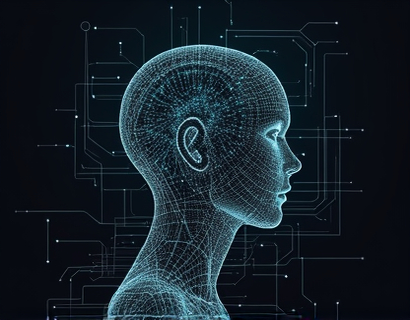AI-Powered Imaginative Companions: Transforming Childhood Development
In recent years, the integration of artificial intelligence in children's toys and digital companions has opened new avenues for enhancing creativity and emotional health. AI-powered imaginative companions, often referred to as digital friends, are redefining the way children interact with technology. These personalized digital entities are not just simple games or apps; they are sophisticated tools designed to foster imaginative play, support social skills, and provide a safe space for emotional exploration.
The Rise of AI-Driven Imaginary Friends
The concept of imaginary friends is not new. For generations, children have created companions in their minds, bringing them to life through play. However, the introduction of AI technology has elevated this concept to a new dimension. AI-driven imaginary friends are digital entities that can adapt to a child's personality, interests, and emotional needs, offering a unique and personalized experience. These companions are designed to engage children in interactive play, encouraging creativity and emotional growth in a safe and nurturing environment.
Personalization at the Core
One of the key features of AI-powered imaginary friends is their ability to personalize interactions. Through advanced algorithms and machine learning, these digital companions can understand and respond to a child's preferences, behaviors, and emotional states. For instance, if a child expresses sadness, the digital friend can offer comfort and engage in activities that help the child process and manage their emotions. This level of personalization ensures that each interaction is meaningful and relevant, fostering a deeper connection between the child and the digital companion.
Fostering Creativity Through Interactive Play
Creativity is a vital aspect of childhood development, and AI-powered imaginary friends excel in stimulating this trait. These digital companions often come with a range of activities and games that encourage imaginative thinking. Children can engage in storytelling, create art, solve puzzles, and explore virtual worlds, all guided by their digital friend. The AI technology adapts the difficulty and complexity of these activities based on the child's progress, ensuring a continuous challenge that promotes growth and learning.
Moreover, the interactive nature of these companions allows children to experiment with different roles and scenarios. For example, a child might play the role of a doctor, with the digital friend acting as a patient. This role-playing not only enhances creativity but also helps children understand different perspectives and develop empathy. The AI-driven companion can provide feedback and suggestions, further enriching the play experience.
Supporting Social Skills Development
Social skills are crucial for a child's overall development, and AI-powered imaginary friends play a significant role in this area. These digital companions can simulate social interactions, helping children practice communication, cooperation, and conflict resolution. For instance, a digital friend might initiate a game that requires taking turns or working together to achieve a goal. Through these interactions, children learn to express themselves clearly, listen to others, and navigate social dynamics.
Additionally, AI-driven imaginary friends can provide a safe space for children to practice social skills in situations they might find challenging in real life. For example, a child who is shy might feel more comfortable practicing a conversation with a digital friend before attempting it with a peer. This gradual exposure can build confidence and reduce anxiety, making social interactions more manageable.
Emotional Growth and Well-Being
Emotional health is as important as cognitive development, and AI-powered imaginary friends offer valuable support in this domain. These digital companions are designed to recognize and respond to a child's emotions, providing a listening ear and emotional support. When a child expresses feelings of fear, joy, or sadness, the digital friend can offer appropriate responses, validating the child's emotions and helping them understand and manage their feelings.
Moreover, these companions can engage in activities that promote emotional intelligence, such as identifying and labeling emotions, understanding cause and effect, and developing strategies for emotional regulation. By interacting with a digital friend that empathizes and provides guidance, children can gain valuable insights into their emotional landscape and learn healthy coping mechanisms.
Creating a Safe Digital Environment
Safety is a paramount concern for parents and guardians when it comes to children's digital experiences. AI-powered imaginary friends are designed with safety features to ensure a secure and positive environment. These companions operate within a controlled digital space, free from inappropriate content, ads, and external links. Parents can also set boundaries and monitor interactions, providing an additional layer of oversight.
Furthermore, the data collected by these digital companions is used solely to enhance the child's experience and is stored securely. There is no sharing of personal information with third parties, and the platform adheres to strict privacy standards. This commitment to safety allows children to explore and learn without the risks associated with other online platforms.
Parental Involvement and Guidance
While AI-powered imaginary friends offer a wealth of benefits, parental involvement remains crucial. Parents can play an active role in their child's interaction with these digital companions, guiding them through the experiences and discussing the lessons learned. This collaboration ensures that the digital interactions align with the family's values and educational goals.
Parents can also use these digital companions as a tool to initiate conversations about emotions, social skills, and creativity. By engaging with their child about the activities and scenarios their digital friend presents, parents can deepen their understanding of their child's thoughts and feelings, fostering a stronger parent-child bond.
Educational Benefits and Beyond
The educational benefits of AI-powered imaginary friends extend beyond creativity and emotional health. These digital companions can support learning in various subjects, from language and math to science and history. For example, a digital friend might create a story that incorporates vocabulary words, helping children learn new words in a fun and engaging way. Similarly, math problems can be presented as challenges to solve, making learning more interactive and enjoyable.
Beyond formal education, these companions can also promote life skills such as responsibility, time management, and goal setting. Children can set objectives for their interactions, such as completing a certain number of activities or learning specific skills, and work towards achieving these goals with the support of their digital friend.
Future Prospects and Considerations
As AI technology continues to advance, the potential for AI-powered imaginary friends to enhance childhood development is vast. Future iterations may include more sophisticated emotional recognition, deeper narrative capabilities, and even the ability to integrate with physical toys and environments, creating a more immersive experience. However, it is essential to approach these advancements with caution, ensuring that the focus remains on the child's well-being and development.
Ethical considerations, such as the impact of screen time, the balance between digital and real-world interactions, and the potential for over-reliance on technology, must be carefully managed. Developers and educators should work together to create guidelines and best practices that maximize the benefits while minimizing any potential drawbacks.
Conclusion
AI-powered imaginary friends represent a groundbreaking fusion of technology and childhood development. By offering personalized, interactive companions, these digital entities are transforming the way children play, learn, and grow emotionally. As this technology continues to evolve, it holds the promise of creating richer, more meaningful experiences for children, supporting their overall development in profound ways. While the journey is just beginning, the potential benefits are clear, making AI-powered imaginative companions an exciting and valuable addition to modern childhood.











































